The AnandTech Coffee Lake Review: Initial Numbers on the Core i7-8700K and Core i5-8400
by Ian Cutress on October 5, 2017 9:00 AM EST- Posted in
- CPUs
- Intel
- Core i5
- Core i7
- Core i3
- 14nm
- Coffee Lake
- 14++
- Hex-Core
- Hyperthreading
Benchmarking Performance: CPU Office Tests
The office programs we use for benchmarking aren't specific programs per-se, but industry standard tests that hold weight with professionals. The goal of these tests is to use an array of software and techniques that a typical office user might encounter, such as video conferencing, document editing, architectural modeling, and so on and so forth.
All of our benchmark results can also be found in our benchmark engine, Bench.
Chromium Compile (v56)
Our new compilation test uses Windows 10 Pro, VS Community 2015.3 with the Win10 SDK to compile a nightly build of Chromium. We've fixed the test for a build in late March 2017, and we run a fresh full compile in our test. Compilation is the typical example given of a variable threaded workload - some of the compile and linking is linear, whereas other parts are multithreaded.
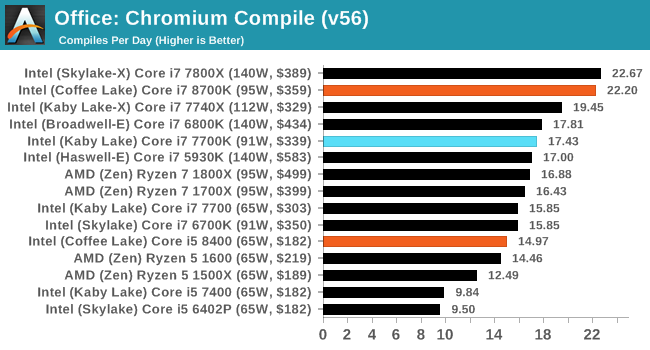
For our compile test, it would appear that the extra memory width afforded by the quad-channel memory of Skylake-X can have a direct benefit in compile performance.
PCMark 10
PCMark 10 is the 2017 update to the family favorite, PCMark 8. PCMark 8 has been part of our test bed since the latest update in Q1. For the most part it runs well, although for some processors it doesn’t recognize, some tests will not complete, leading to holes in our benchmark data (there’s also an odd directory quirk in one test that causes issues). The newest version, PCMark 10, is the answer.
The new test is adapted for more 2016/2017 workflows. With the advent of office applications that perform deeper compute tasks, or the wave of online gamers and streamers, the idea behind PCMark 10 is to give a better ‘single number’ result that can provide a comparable metric between systems. Single metrics never tell the whole story, so we’re glad that Futuremark provides a very detailed breakdown of what goes on.
Ganesh’s article on PCMark 10 goes into more detail than I will here, but the ‘Extended Benchmark’ runs through four different sets of tests: Essential, Productivity, Creation and Gaming. Each of these have sub-test results as well, including startup performance, web performance, video conferencing, photo/video editing, spreadsheets, rendering, and physics, which you can find in Bench.
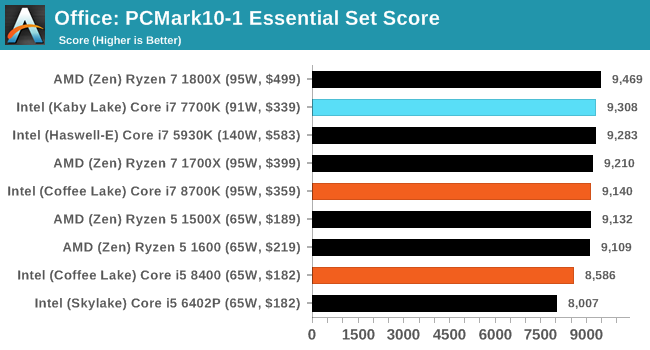
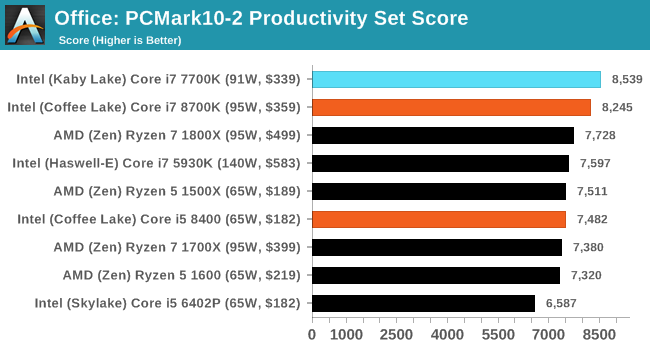
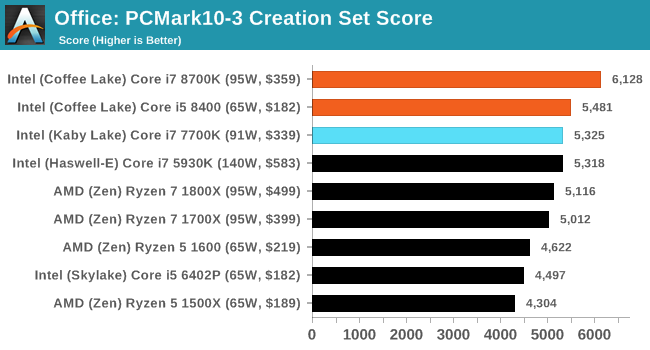
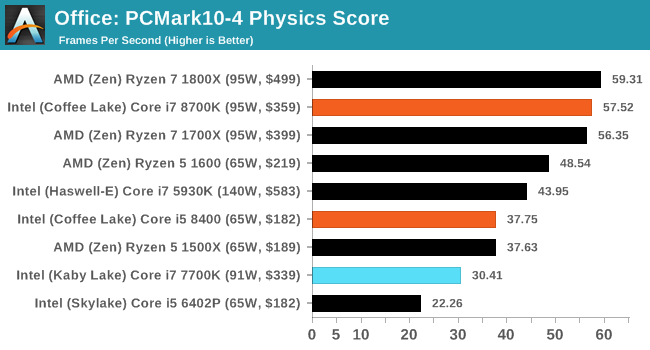
PCMark8: link
Despite originally coming out in 2008/2009, Futuremark has maintained PCMark8 to remain relevant in 2017. On the scale of complicated tasks, PCMark focuses more on the low-to-mid range of professional workloads, making it a good indicator for what people consider 'office' work. We run the benchmark from the commandline in 'conventional' mode, meaning C++ over OpenCL, to remove the graphics card from the equation and focus purely on the CPU. PCMark8 offers Home, Work and Creative workloads, with some software tests shared and others unique to each benchmark set.
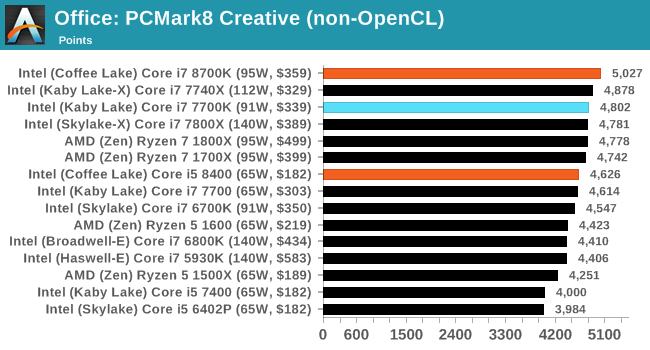
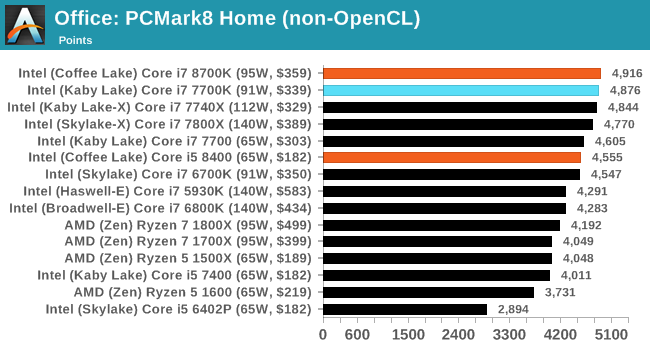
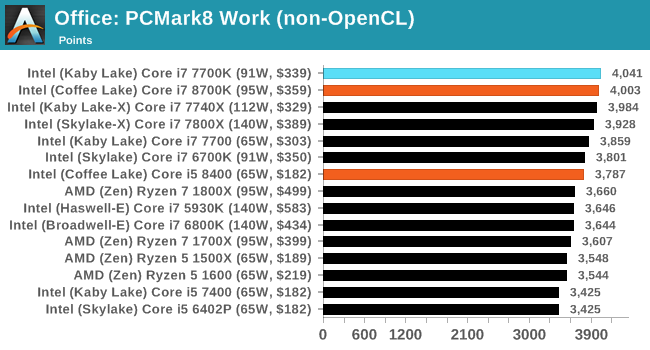










222 Comments
View All Comments
xchaotic - Monday, October 9, 2017 - link
Well yeah, but even with non-HT i5 and i3, you still have plenty of cores to work with.Even if the OS (or a background task - say Windows Defender?) takes up a thread, you still have other cores for your game engine.nierd - Monday, October 9, 2017 - link
Do we? I've yet to see a good benchmark that measures task switching and multiple workloads - they measure 'program a' that is bad at using cores - and 'program b' that is good at using cores.In today's reality - few people are going to need maximum single program performance. Outside of very specific types of workloads (render farming or complex simulations for science) please show me the person that is just focused on a single program. I want to see side by side how these chips square off when you have multiple completing workloads that force the scheduler to balance tasks and do multiple context shifting etc. We used to see benchmarks back in the day (single core days) where they'd do things like run a program designed to completely trash the predictive cache so we'd see 'worst case' performance, and things that would stress a cpu. Now we run a benchmark suite that shows you how fast handbrake runs *if it's the only thing you run*.
mapesdhs - Tuesday, October 10, 2017 - link
I wonder if there's pressure never to test systems in that kind of real-world manner, perhaps the results would not be pretty. Not so much a damnation of the CPU, rather a reflection of the OS. :D Windows has never been that good at this sort of thing.boeush - Monday, October 9, 2017 - link
An *intelligent* OS thread scheduler would group low-demand/low-priority threads together, to multitask on one or two cores, while placing high-priority and high-CPU-utilization threads on respective dedicated cores. This would maximize performance and avoid trashing the cache, where and when it actually matters.If Windows 10 makes consistent single-thread performance hard to obtain, then the testing is revealing a fundamental problem (really, a BUG) with the OS' scheduler - not a flaw in benchmarking methodology...
samer1970 - Monday, October 9, 2017 - link
I fail to understand how you guys review a CPU meant for overclocking and only put non OC results in your tables ?If I wanted the i7 8700K without overclocking I would pick up the i7 8700 ans save $200 for both cooling and cheaper motherboard. and the i7 8700 can turbo all 6 cores to 4.3Ghz just like the i7 8700K
someonesomewherelse - Saturday, October 14, 2017 - link
Classic Intel, can't they make a chipset/socket with extra power pins so it would last for at least a few cpu generations?Gastec - Saturday, October 14, 2017 - link
I'm getting lost in all these CPU releases this year, it feels like there is a new CPU coming out every 2 months. Don't get me wrong, I like to have many choices but this is pathetic really. Someone is really desperate for more money.zodiacfml - Sunday, October 15, 2017 - link
The i3!lordken - Saturday, October 28, 2017 - link
cant you make bars for amd cpus red in graphs? Its crap to search for them if all lines are black (at least 7700k was highlighted in some)a bit disappointed, not a single world of ryzen/amd on summary page, you compare only to intel cpus? how come?
why only 1400 in civ AI test and not any R7/5 CPUs?
Also I would expect you hammer down intel a bit more on that not-so-same socket crap.
Ritska - Friday, November 3, 2017 - link
Why is 6800k faster then 7700k and 8700k in gaming? Is it worth buying if I can get one for 300$?